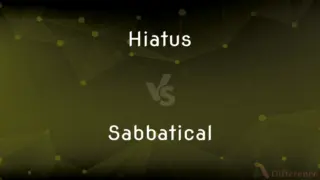Staff vs. Wand — What's the Difference?
Edited by Tayyaba Rehman — By Fiza Rafique — Updated on April 16, 2024
A staff is a long, sturdy stick used for support or as a weapon, symbolizing authority or power in various cultures; a wand is a shorter, thinner rod, often associated with magic and conjuring in folklore and fiction.

Difference Between Staff and Wand
Table of Contents
ADVERTISEMENT
Key Differences
A staff, typically a long stick ranging from about as tall as a person to slightly taller, serves various purposes, including walking support, weapon use, and ceremonial representation. On the other hand, a wand is generally a much shorter and thinner rod, commonly used as a symbolic or functional tool in magical practices, both in fictional settings and some real-world rituals.
Staffs are often made from sturdy materials like wood or metal, making them suitable for physical support or as a defensive weapon. Whereas wands are usually crafted from lighter materials such as wood, metal, or even plastic, emphasizing their symbolic rather than functional strength.
In cultural contexts, the staff often appears as a symbol of authority and power. It is seen in the hands of figures like wizards, religious leaders, and mythological deities, signifying control or leadership. On the other hand, wands are more closely tied to the themes of magic and fantasy, symbolizing the power to perform spells and enchantments.
Historically, staffs have been used across various cultures for practical purposes such as hiking or herding, as well as in martial arts. Wands, however, have been predominantly associated with esoteric traditions like witchcraft, ceremonial magic, and as props in performances of stage magic.
While staffs can be part of official regalia in formal ceremonies and processions, symbolizing office or rank, wands are often used more privately in rituals or publically in entertainment contexts, like magic shows, where they add a dramatic flair to performances.
ADVERTISEMENT
Comparison Chart
Length and Build
Long and sturdy, can be used for support
Shorter and thinner, typically not for support
Material
Often wood or metal
Commonly wood, metal, or plastic
Cultural Symbolism
Authority, power, guidance
Magic, mysticism, fantasy
Usage Contexts
Walking, weapon, ceremonial
Magical rituals, entertainment
Associations
Leadership, authority figures, mythical heroes
Magicians, wizards, fantasy characters
Compare with Definitions
Staff
A long stick used as a support while walking or hiking.
He leaned on his staff as he climbed the steep trail.
Wand
A thin stick used by magicians and wizards.
The wizard waved his wand, and the room filled with light.
Staff
A weapon made of wood or metal.
Martial artists train with a staff to improve their balance and coordination.
Wand
A tool in magic tricks and stage performances.
With a flick of his wand, the magician made a dove appear.
Staff
An item used in performances or ceremonies.
The magician’s staff was adorned with mystical symbols.
Wand
A ceremonial object in esoteric and occult practices.
She used a crystal-tipped wand during the ritual.
Staff
A rod or pole that signifies authority or office.
The bishop carried a staff as a symbol of his pastoral authority.
Wand
A prop in stories and films about magic.
Each wand in the movie was unique to its owner.
Staff
A tool used in various cultural and religious contexts.
In many cultures, a staff is carried by figures of great respect and authority.
Wand
An object representing power in a mystical or symbolic sense.
Her wand was more a symbol of her wisdom than a source of power.
Staff
A stick or cane carried as an aid in walking or climbing.
Wand
A wand is a thin, light-weight rod that is held with one hand, and is traditionally made of wood, but may also be made of other materials, such as metal or plastic. Long versions of wands are often styled in forms of staves or sceptres, which could have large ornamentation on the top.
Staff
A stout stick used as a weapon; a cudgel.
Wand
A thin supple rod, twig, or stick.
Staff
A pole on which a flag is displayed; a flagstaff.
Wand
A slender rod carried as a symbol of office in a procession; a scepter.
Staff
A rod or baton carried as a symbol of authority.
Wand
(Music) A conductor's baton.
Staff
Pl. staffs A rule or similar graduated stick used for testing or measuring, as in surveying.
Wand
A stick or baton used by a magician, conjurer, or diviner.
Staff
A group of assistants to a manager, executive, or other person in authority.
Wand
A stick or baton associated with the supernatural as a source of power.
Staff
A group of military officers assigned to assist a commanding officer in an executive or advisory capacity.
Wand
A pipelike attachment that lengthens the handle of a device or tool
A vacuum cleaner that has two extension wands.
Staff
The personnel who carry out a specific enterprise
The nursing staff of a hospital.
Wand
A handheld electronic device, often shaped like a rod, that is used for security purposes to detect metal.
Staff
Something that serves as a staple or support.
Wand
(Sports) A narrow slat used as an archery target.
Staff
(Music) A set of horizontal lines and intermediate spaces used in notation to represent a sequence of pitches, in modern notation normally consisting of five lines and four spaces. Also called stave.
Wand
To scan (a person, for example) with an electronic wand.
Staff
A building material of plaster and fiber used as an exterior wall covering of temporary buildings, as at expositions.
Wand
A hand-held narrow rod, usually used for pointing or instructing, or as a traditional emblem of authority.
Staff
To provide with a staff of workers or assistants.
Wand
(by extension) An instrument shaped like a wand, such as a curling wand.
Staff
To serve on the staff of (an organization).
Wand
A stick or rod used by a magician (a magic wand), conjurer or diviner (divining rod).
Staff
A long, straight, thick wooden rod or stick, especially one used to assist in walking.
Wand
A stick, branch, or stalk, especially of willow.
Staff
A series of horizontal lines on which musical notes are written; a stave.
Wand
A card of a particular suit of the minor arcana in tarot, the wands.
Staff
The employees of a business.
The company employed 10 new members of staff this month.
The company has taken on 1600 more highly-paid staff.
Wand
(transitive) To scan (e.g. a passenger at an airport) with a metal detector.
Staff
(uncountable) A mixture of plaster and fibre used as a temporary exterior wall covering.W
Wand
A small stick; a rod; a verge.
With good smart blows of a wand on his back.
Staff
A pole, stick, or wand borne as an ensign of authority; a badge of office.
A constable's staff
Wand
A staff of authority.
Though he had both spurs and wand, they seemed rather marks of sovereignty than instruments of punishment.
Staff
A pole upon which a flag is supported and displayed.
Wand
A rod used by conjurers, diviners, magicians, etc.
Picus bore a buckler in his hand;His other waved a long divining wand.
Staff
(archaic) The rung of a ladder.
Wand
A baton used by a magician or water diviner
Staff
A series of verses so disposed that, when it is concluded, the same order begins again; a stanza; a stave.
Wand
A ceremonial or emblematic staff
Staff
(engineering) An arbor, as of a wheel or a pinion of a watch.
Staff
(surgery) The grooved director for the gorget, or knife, used in cutting for stone in the bladder.
Staff
(military) An establishment of officers in various departments attached to an army, to a section of an army, or to the commander of an army. The general's staff consists of those officers about his person who are employed in carrying his commands into execution.
Staff
A form of token once used, in combination with a ticket, for safe train movements between two points on a single line.
Staff
(transitive) To supply (a business, volunteer organization, etc.) with employees or staff members.
Staff
A long piece of wood; a stick; the long handle of an instrument or weapon; a pole or stick, used for many purposes; as, a surveyor's staff; the staff of a spear or pike.
And he put the staves into the rings on the sides of the altar to bear it withal.
With forks and staves the felon to pursue.
Staff
A stick carried in the hand for support or defense by a person walking; hence, a support; that which props or upholds.
The boy was the very staff of my age.
He spoke of it [beer] in "The Earnest Cry," and likewise in the "Scotch Drink," as one of the staffs of life which had been struck from the poor man's hand.
Staff
A pole, stick, or wand borne as an ensign of authority; a badge of office; as, a constable's staff.
Methought this staff, mine office badge in court,Was broke in twain.
All his officers brake their staves; but at their return new staves were delivered unto them.
Staff
A pole upon which a flag is supported and displayed.
Staff
The round of a ladder.
I ascended at one [ladder] of six hundred and thirty-nine staves.
Staff
A series of verses so disposed that, when it is concluded, the same order begins again; a stanza; a stave.
Cowley found out that no kind of staff is proper for an heroic poem, as being all too lyrical.
Staff
The five lines and the spaces on which music is written; - formerly called stave.
Staff
An arbor, as of a wheel or a pinion of a watch.
Staff
The grooved director for the gorget, or knife, used in cutting for stone in the bladder.
Staff
An establishment of officers in various departments attached to an army, to a section of an army, or to the commander of an army. The general's staff consists of those officers about his person who are employed in carrying his commands into execution. See État Major.
Staff
Hence: A body of assistants serving to carry into effect the plans of a superintendent or manager; sometimes used for the entire group of employees of an enterprise, excluding the top management; as, the staff of a newspaper.
Staff
Plaster combined with fibrous and other materials so as to be suitable for sculpture in relief or in the round, or for forming flat plates or boards of considerable size which can be nailed to framework to make the exterior of a larger structure, forming joints which may afterward be repaired and concealed with fresh plaster.
Staff
Personnel who assist their superior in carrying out an assigned task;
The hospital has an excellent nursing staff
The general relied on his staff to make routine decisions
Staff
The body of teachers and administrators at a school;
The dean addressed the letter to the entire staff of the university
Staff
A strong rod or stick with a specialized utilitarian purpose;
He walked with the help of a wooden staff
Staff
Building material consisting of plaster and hair; used to cover external surfaces of temporary structure (as at an exposition) or for decoration
Staff
A rod carried as a symbol
Staff
(music) the system of five horizontal lines on which the musical notes are written
Staff
Provide with staff;
This position is not always staffed
Staff
Serve on the staff of;
The two men staff the reception desk
Common Curiosities
What are the typical materials used for staffs and wands?
Staffs are commonly made from wood or metal due to their need for strength and durability, while wands can also be made from lighter materials like plastic.
What is a staff?
A staff is a long, sturdy stick used for support, as a weapon, or as a ceremonial symbol.
What cultural significance do staffs hold?
Staffs often symbolize authority and power, and are used by figures of leadership or spiritual significance in many cultures.
Are wands always associated with magic?
While commonly linked to magic, wands also appear in various cultural and religious rituals and are used in entertainment magic.
Who typically uses a staff?
Staffs are used by hikers, shepherds, martial artists, religious and ceremonial leaders, among others.
What is a wand?
A wand is a short, thin rod typically used in magical practices or as a theatrical prop.
How does the symbolism of staffs and wands differ?
Staffs symbolize practical strength, authority, and leadership, whereas wands are more emblematic of the mystical, magical, and fantastical.
How are staffs and wands perceived in popular culture?
In popular culture, staffs are often seen with wise leaders or warriors, while wands are prominently featured in fantasy genres associated with wizards and magical beings.
How are staffs and wands different in their construction?
Staffs are longer and built to support weight or deliver force, while wands are lighter and designed more for symbolic or decorative purposes.
Can both staffs and wands be used in magic?
Yes, both can be used in magic, but wands are more commonly associated with spell-casting and magical acts, both in reality and fiction.
Do staffs have a practical use beyond ceremonial?
Yes, staffs are often used for practical purposes such as walking aids or in martial arts.
Are there specific rituals associated with wands?
Yes, wands are often used in specific magical or religious rituals to channel energies or symbolize power.
Can anyone use a staff or a wand?
Yes, there are no restrictions on who can use a staff or a wand, although their contexts and meanings might vary.
What is the historical importance of staffs and wands?
Historically, staffs have been tools of support and authority across various cultures, while wands have been linked to magical practices and theatrical performances.
Who typically uses a wand?
Wands are used by magicians, both fictional and stage performers, as well as practitioners of certain esoteric traditions.
Share Your Discovery

Previous Comparison
Celestial vs. Cosmic
Next Comparison
Hiatus vs. SabbaticalAuthor Spotlight
Written by
Fiza RafiqueFiza Rafique is a skilled content writer at AskDifference.com, where she meticulously refines and enhances written pieces. Drawing from her vast editorial expertise, Fiza ensures clarity, accuracy, and precision in every article. Passionate about language, she continually seeks to elevate the quality of content for readers worldwide.
Edited by
Tayyaba RehmanTayyaba Rehman is a distinguished writer, currently serving as a primary contributor to askdifference.com. As a researcher in semantics and etymology, Tayyaba's passion for the complexity of languages and their distinctions has found a perfect home on the platform. Tayyaba delves into the intricacies of language, distinguishing between commonly confused words and phrases, thereby providing clarity for readers worldwide.
















































